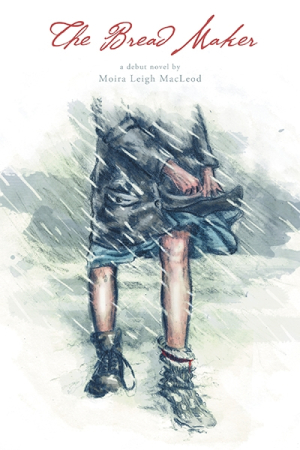The Bread Maker
This novel is a stirring reminder of the basic human instinct to persevere through even the toughest times.
The Bread Maker by Moira Leigh MacLeod is a lush and complex narrative that communicates the beauty of a life filled with grace, hard work, and overcoming adversity.
Beginning in October of 1933 and spanning some twelve years, The Bread Maker tells the story of Mabel, a young woman with a singular aspiration to bake the best bread in town at Cameron’s Store.
Faced with one horrific tragedy after another, from vicious attacks by her drunkard father and his friends to nearly dying after getting caught in a dangerous blizzard, Mabel is the central figure in a small mining town full of secrets. As tensions mount and more of these secrets are revealed, Mabel must look out for herself while also doing what’s right—a task not easily achieved.
MacLeod’s greatest feat in The Bread Maker is character development. She introduces a cast of believable, compelling characters that stand alone well but are intricately woven together, creating a series of plotlines that advance the story in necessary ways. These characterizations bring forward a town full of vibrant and interesting people who justify the amount of attention they are given in the lengthy but never tedious book. Content throughout is clear and engaging.
The story is also well paced. An omniscient narrator briskly vacillates between characters, revealing thoughts and emotions that are absolutely necessary to the story, as when the details of a grisly murder run rampant through town. Choice conversations and beliefs are disclosed, establishing the moral standings of various characters as well as revealing the killer’s motivations.
MacLeod’s use of language is a standout feature of the book. She has a firm command of diction and imagery, and does not sacrifice the book’s impact by relying on flowery prose. The text is stirring and beautiful, yet never overshadows the book’s central purpose, which is to tell Mabel’s story.
The book falters most on the technical end. It has an overabundance of section and chapter breaks—giving each separate day its own section, with several small chapters within those sections—and this unnecessarily breaks up the story, seeming to waste page space. Errors in punctuation are also distracting, particularly around the pluralization of character names.
A story of love and redemption born out of hardship, The Bread Maker is a stirring reminder of the basic human instinct to persevere through even the toughest times.
Reviewed by
Amanda Adams
Disclosure: This article is not an endorsement, but a review. The publisher of this book provided free copies of the book and paid a small fee to have their book reviewed by a professional reviewer. Foreword Reviews and Clarion Reviews make no guarantee that the publisher will receive a positive review. Foreword Magazine, Inc. is disclosing this in accordance with the Federal Trade Commission’s 16 CFR, Part 255.

